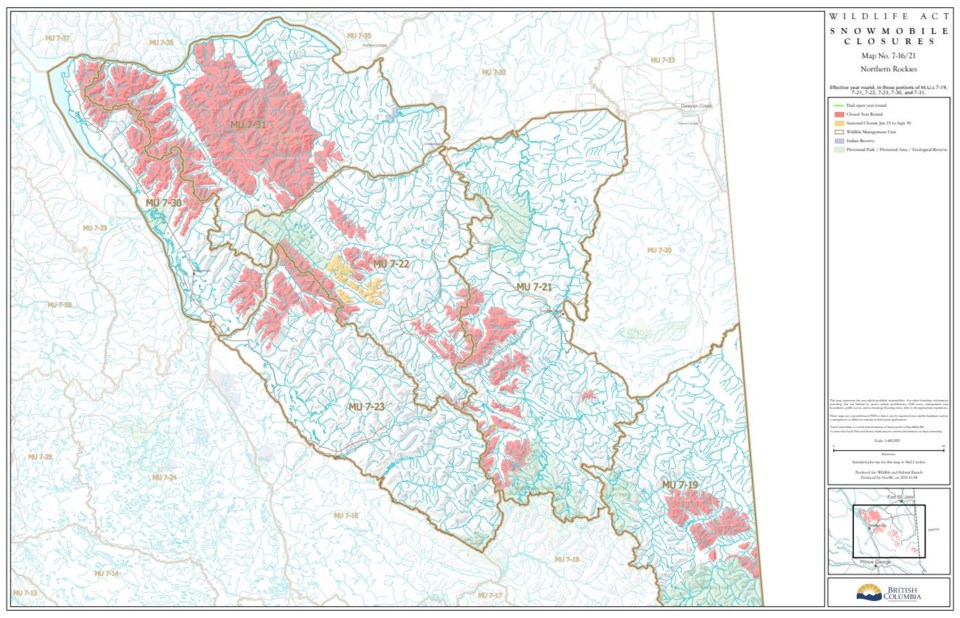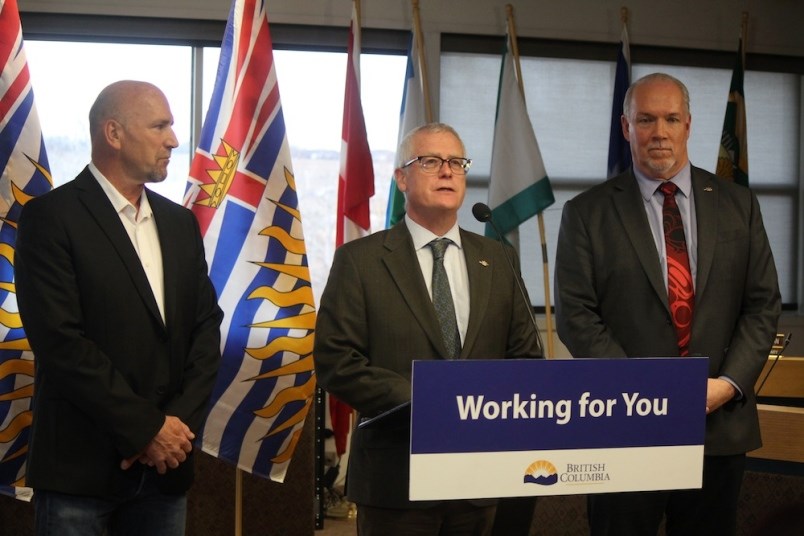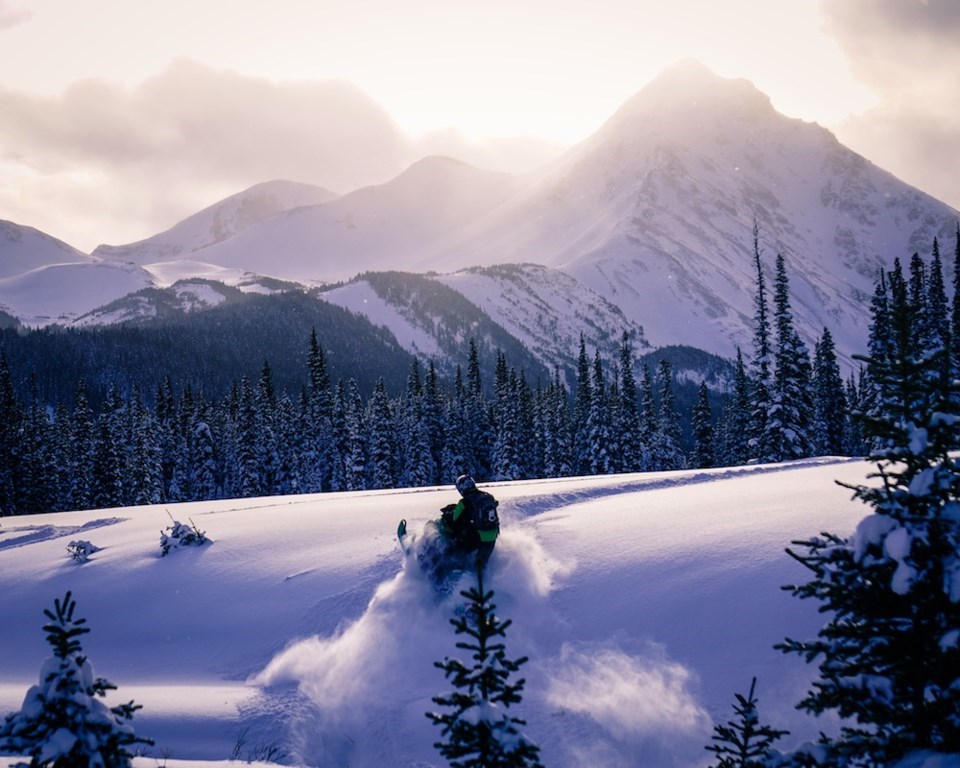The province’s decision to close more areas of the South Peace to snowmobilers has drawn condemnation and concern from leaders across the Peace River Regional District.
According to a Dec. 21 release, around 454,000 hectares of Crown land in 13 riding areas are now closed to protect caribou habitat and population recovery, with the ministry of lands and forests saying 71% of riding areas will remain open for riders.
But the sudden pre-Christmas announcement was strongly rebuked at the Jan. 13 PRRD meeting, with directors saying the province has ignored the socioeconomic impacts of its decisions as well as hundreds of hours of work put in by local clubs.
“It seems to be that there is a disconnect in what was said and what’s actually happening,” said Electoral Director Dan Rose, raising his concerns about the “dishonesty” of the ministry’s press release. “If we’re going to continue to talk and hope to have input from folks, they have to hope and understand that their time committed is actually going to be taken and it’s going to be looked at, but none of it was.”
Chetwynd Mayor Allen Courtoreille says his community's snowmobile club is so dissatisfied that it’s no longer interested speaking with him, council, or the province.
“They barely want to talk to me, never mind want to talk to the government again,” said Courtoreille, noting his council preparing a response to the province and that the PRRD needs to respond as well.
“They gave [the province] all the information because they were engaged at that time, and now they are disengaged. The snowmobile clubs are disengaged because of the fact that all the groundwork they’ve done and research that they’ve done was used against them and to stop them getting into the 70 per cent of open space where they could ride.”

Tumbler Ridge Mayor Keith Bertrand said the clubs that took part in a snowmobile advisory committee bought in to the province’s focus on caribou recovery, and that there was give and take on both sides. The committee put more than 500 hours of work into its advisory report to the province, he said.
"All of our work contributed to the little areas that we have left open,” Bertrand said. “If we hadn’t compiled the real value of snowmobiling to the riders in the area it would have been a blanket closure, so I’m happy for the fact we have a little bit of area open.”
However, those areas are for expert riding and not family-friendly, or require riders to cross through other protected areas, he said.
"When you look at the maps, like Google Earth or whatever it might be, from a 10,000-metre perspective, it is 70 per cent [open], 30 per cent closed. However, in order to get to the 70 per cent that’s open, you have to cross a 1,400-metre mark high altitude, which is closed,” Bertrand said.
“So unless Victoria thinks that we're going to heli snowmobiles into these areas, more work needs to be done for legal access trails, which we recommended in the South Peace Snowmobile Advisory Report.”
The ministry's release says it is providing $150,000 to local clubs for “recreation enhancements” such as new trails, but Bertrand called the sum “ridiculous.” An entire section of the advisory report identifying improvement and restoration projects was “completely ignored,” he said.
“Disappointment is certainly not the word,” Bertrand said, adding he agreed the regional district needed to respond to the “misinformation” in the province’s announcement.
Rose added the province has offered no compensation to recreational equipment shops directly impacted by the closures.
“Many of them are talking about a 40% reduction in gross revenues for the year because of this and there’s just nothing there. It was basically, ‘well, if you want caribou on the landscape, you got to go,’” Rose said. “That’s not how this thing was put forward, that’s not how this process was supposed to work.”

Dawson Creek Mayor Dale Bumstead says his council wasn’t consulted despite being directly named in the ministry’s release. He said his council was disappointed in the initial direction the province took before signing caribou agreements with the West Moberly and Saulteau First Nation in 2020, and pleaded to be part of the discussions.
“We never sat at the table. They never engaged with us,” Bumstead said. “[The release] indicates specifically discussions were held with local governments including Mackenzie, Tumbler Ridge, Chetwynd, Dawson Creek, and Fort St. John. That’s not true.”
Board Chair Brad Sperling said he understood why the snowmobile clubs are feeling burned by the process.
"That's what has to be stressed: there was no real meaningful conversation and input. From what I see, the snowmobile association and the clubs, 500 — they went above and beyond and they weren't listened to,” Sperling said. “And the rest of us, we weren't even talked to.”
Directors voted to write a letter to Premier John Horgan and Katrine Conroy, the provincial minister for lands and forests, about their concerns. Taylor Mayor Rob Fraser said it will be either the PRRD, or Horgan and Conroy, who will need to define what the next steps will be.
“They put together a consulting process that really was them just advising us what it was they were going to do, but looking for information. So they heard us, they didn’t listen to us,” Fraser said. “They had this big scheme around hearing us so that they could come, eventually, to this press release that they made, and say, look what we did with everybody being involved — which is even worse.”
“The 70 per cent that they’re allowed [to ride in] are not accessible, so there’s got to be a way to get access in there and still allow caribou to exist and proliferate,” Fraser said. “That should be a goal that we’re after.”
Bumstead said he also worried racism and hatred would again escalate toward West Moberly and Saulteau over the issue. He suggested the PRRD also try engaging with them, noting “this is about us as neighbours trying to work together to find a solution.”
“I really worry about that still, if that [racism and hatred] might escalate,” Bumstead said. “I’m wondering if there’s an opportunity for us. We talk about the province, but to engage with West Moberly and Saulteau leadership, and talk to them.”
Fort St. John Mayor Lori Ackerman also wants to ally and engage with the two nations.
"The way the process has taken place will have a profound effect on industries and our communities simply because engagement is going to be diminished significantly as a result,” Ackerman said, “and that just cannot happen. We want to continue to work together with them.”
Tom Summer, Alaska Highway News, Local Journalism Initiative. Email Tom at [email protected]



